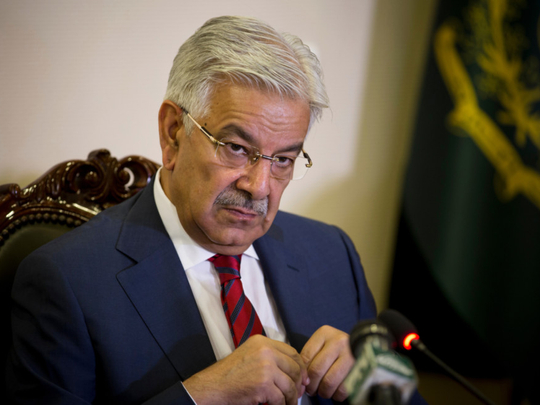
Pakistan’s judges continue to deliver one landmark verdict after another. The latest one was the Islamabad High Court’s dismissal of foreign minister Khawaja Asif on Thursday for remaining employed abroad, even after his election to the parliament in 2013.
The ruling Pakistan Muslim League-Nawaz (PML-N) party continues to dismiss such judicial outcomes as a ploy to undermine the South Asian country’s democracy. But the signs of improving law enforcement against high-profile figures are cause for celebration since the rule of law across large parts of the country remains virtually in tatters.
Reversing this sorry legacy is important for Pakistan, as the country prepares to go through another political transition with parliamentary elections due later this year. Politicians like Asif or Nawaz Sharif — the former prime minister who was removed in a July 2017 by a Supreme Court verdict — feel they are being victimised. Sharif’s conviction followed a widely-publicised trial when his children were found to be in possession of significant overseas wealth and were unable to prove convincingly how it was acquired. And like Asif, Sharif was also found to be in possession of a foreign work permit.
In the short term, politicians like Sharif or Asif may point towards the verdicts against them as a case of miscarriage of justice. But in the long term, it is precisely the kind of law enforcement that will enhance Pakistan’s prospects.
For the moment, the ruling structure appears determined to ignore the best democratic practices worldwide and carry on visibly with a determination to pursue their narrow self-interests. On Friday, the circumstances surrounding Pakistan’s annual budget amply proved the disconnect between the PML-N led by Prime Minister Shahid Khaqan Abbasi, a Sharif loyalist, and the country’s mainstream. The budget was presented by Miftah Esmail, an unelected figure who was sworn in as Finance Minister just hours before the budget — clearly in defiance of some of the best practices surrounding mainstream democratic politics. Previously, Esmail served for many months as an unelected adviser to the prime minister on finance with the rank of a federal minister.
In addition to the controversy surrounding Esmail for being an unelected politician, the budget itself primarily focused on new incentives rather than pushing ahead with long overdue but seemingly tough reforms. Undoubtedly, the budget was meant to work as a sop ahead of the 2018 elections in areas like re-asserting a sharp reduction in income tax rates or re-affirming a recently-introduced amnesty for tax evaders.
Such incentives have been offered earlier too without bringing about a change for the better. Time and again, it has been proven globally without a doubt that reforming a state involves comprehensive reforms including some very painful ones.
Without the promise of strict law enforcement on matters like tax evasion, experience worldwide has repeatedly shown that reforming countries is not easy. Going forward, the changes being forced upon Pakistan by the court verdicts will need to be followed up aggressively to ensure that they become a precedent for the future. For instance, the national election commission will need to vet candidates ahead of parliamentary elections rigorously. Essential background checks on candidates’ links to foreign countries should be aggressively scrutinised, in view of the recent high-profile verdicts.
Such moves may be seen as overly aggressive, but these practices are the norm in many democratic countries, where the rules on conflict of interest are strictly enforced. Beyond the cases taken up by the Supreme Court and local high courts, revisiting the central pillars of a modern-day democratic state is integral to Pakistan’s future.
In brief, the key responsibilities of a progressive state primarily must revolve around three major areas: 1) Enforcing a legal and constitutional framework; 2) Enforcing an efficient revenue collection system; 3) Providing an efficient and fair framework for internal security. In Pakistan’s case, the state hardly appears to have lived up to its obligations in these aspects.
It’s therefore hardly surprising that convictions of influential politicians have triggered verbal backlash without considering its implications on the long-term future of democracy. When you consider Pakistan’s history and the present-day situation, it’s amply evident that tighter law enforcement is essential.
Pakistan’s next elected government will have to undertake comprehensive reforms to overhaul one of the worst tax collection systems in the world, that has lost its ability to force a large number of tax evaders to pay their dues.
Besides enforcing the law and making people pay taxes, all kinds of lawlessness have to be curbed. The Pakistan Army’s robust effort appears to have pushed back the advancing tide of Taliban militants, but important civil institutions such as the police remain much too weak and disorganised for the task.
Without progress on these vital fronts, Pakistan’s long-term prospects will remain bleak. Even though ousted politicians seek to defy the law, what is at stake is the future of Pakistan and not just of a coterie of powerful individuals.
Farhan Bokhari is a Pakistan-based commentator who writes on political and economic matters.








